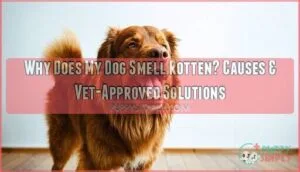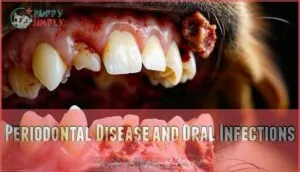This site is supported by our readers. We may earn a commission, at no cost to you, if you purchase through links.

From impacted anal glands releasing a fishy reek to yeast brewing in skin folds, foul smells rarely appear without cause. Understanding what’s behind that rotten smell means distinguishing between a grooming oversight and a health issue demanding veterinary attention.
Some odors resolve with a bath and toothbrush, while others point to infections, dental decay, or gastrointestinal problems that worsen without treatment.
Table Of Contents
- Key Takeaways
- Why Does My Dog Smell Rotten?
- Dental Problems That Cause Bad Odors
- Skin, Ear, and Anal Sac Issues
- Digestive and Dietary Factors
- Solutions and Prevention for Dog Odors
- Frequently Asked Questions (FAQs)
- Why does my dog smell Rotten?
- Why does my older dog smell bad?
- Why does my Dog’s Breath smell like rotten garbage?
- What if my dog smells bad?
- Why is my dog Stinky?
- What does bad breath smell like in dogs?
- Why does my dog smell like hes rotting from the inside out?
- What does it mean if your dog smells rotten?
- What does liver failure smell like in dogs?
- Why does my dog smell bad down there?
- Conclusion
Key Takeaways
- At least 80% of dogs over age three develop periodontal disease, making dental decay the leading cause of rotten breath and a health issue that demands regular brushing and professional cleanings to prevent escalation.
- Rotten odors rarely appear without cause—they often signal specific problems like impacted anal glands (affecting 12% of dogs annually), yeast infections in skin folds, ear infections, or serious conditions like abscesses and parvovirus requiring immediate veterinary attention.
- Breeds with deep skin folds (Bulldogs, Pugs) or oily coats (Basset Hounds, Cocker Spaniels) face higher odor risks due to moisture-trapping anatomy that creates breeding grounds for bacteria and yeast, making targeted hygiene essential.
- Sweet or fruity breath signals diabetic ketoacidosis—a metabolic emergency requiring immediate veterinary care—not typical bad breath, and should never be dismissed as routine oral odor.
Why Does My Dog Smell Rotten?
If your dog smells rotten, you’re not overreacting—something’s likely wrong. While all dogs have their own natural scent, a truly foul odor often points to an underlying health issue that needs attention.
Let’s look at the most common culprits behind that rotten smell and what they mean for your dog’s health.
Common Causes of Foul Dog Odors
A rotten smell wafting from your dog isn’t just unpleasant—it’s often your first clue that something’s gone wrong beneath the fur. The culprits range widely: foul breath from dental disease, yeast infections nestling in skin folds, impacted anal glands releasing a fishy stench, or ear infections brewing inside those floppy ears.
Sometimes diet factors play a role, turning normal doggy odor into something truly offensive.
Breeds Prone to Odor Issues
Your dog’s breed plays a bigger role in odor than you might expect. English Bulldogs, French Bulldogs, and Pugs top the list—their deep skin folds trap moisture and bacteria, creating a breeding ground for smells. Basset Hounds and Cocker Spaniels battle oily coats and chronic ear infections, while brachycephalic breeds face higher anal sac disorder rates.
Breed odor factors aren’t just cosmetic—they’re tied to canine health risks requiring targeted hygiene. Regular grooming is essential to prevent dog odor issues that can lead to more severe health problems.
When Rotten Smells Signal Health Problems
Not every smell is harmless—some rotten odors are your dog’s way of waving a red flag about a serious internal problem. Infections from abscesses, parvovirus, or severe ear infections create putrid smells that demand immediate veterinary care.
A rotten smell from your dog isn’t just unpleasant—it’s often a red flag signaling infections or serious health issues that need immediate veterinary attention
Skin problems, untreated bacterial infections, and impacted anal sacs can signal urgent health risks requiring professional disease prevention and pet wellness intervention.
Dental Problems That Cause Bad Odors
Your dog’s mouth can tell you a lot about their overall health, and sometimes the story isn’t pleasant. At least 80% of dogs over age 3 develop periodontal disease, making dental issues the most common source of rotten odors you’ll notice when your dog breathes or yawns.
Let’s look at the specific dental problems that might be causing that foul smell.
Periodontal Disease and Oral Infections
When oral bacteria form a thick film on your dog’s teeth, they don’t just sit there—they burrow under the gumline, destroying bone and tissue while releasing sulfur compounds that smell like decay.
Here’s what you need to know about periodontal disease and oral infections:
- At least 80% of dogs over age 3 develop periodontal disease, making it the leading cause of rotten or foul breath in canines.
- In 2023, 73% of dogs assessed by nationwide pet hospitals were diagnosed with dental problems contributing to oral malodor.
- Tooth decay and gum disease create pockets where food particles and bacteria accumulate, intensifying bad breath.
- Regular dental care reduces periodontal disease incidence by up to 45% compared to dogs without routine oral hygiene.
Consistent dog dental hygiene—brushing your dog’s teeth and professional cleanings—prevents these dental problems from escalating. Understanding periodontal disease causes is key for effective prevention and treatment.
Sweet or Fruity Breath: What It Means
If your dog’s breath suddenly smells sweet or fruity—almost like nail polish remover—you’re picking up on a warning sign that goes far beyond typical bad breath. This distinct scent often indicates diabetic ketoacidosis, a serious metabolic emergency where your dog’s body burns fat instead of glucose for energy. The sweet smells come from ketones accumulating in the bloodstream.
You might also notice increased thirst, frequent urination, or lethargy alongside the fruity breath. Immediate veterinary advice and guidance is essential—this condition requires prompt diagnosis and treatment.
Don’t mistake this yeast-like smell for routine foul mouth odors; sweet smell diagnosis can be lifesaving when caught early.
Skin, Ear, and Anal Sac Issues
Your dog’s skin, ears, and anal glands are common trouble spots that can produce surprisingly strong odors. These areas create the perfect environment for bacteria and yeast to thrive, especially when things aren’t quite right.
Let’s look at the specific conditions that turn these body parts into sources of that rotten smell you’re noticing.
Skin Fold Dermatitis and Seborrhea
Some breeds carry extra baggage in the form of skin folds—and those warm, moist crevices can turn into breeding grounds for trouble. Skin fold dermatitis and seborrhea are two common canine skin conditions that produce unmistakable odors. Here’s what you’re dealing with:
- Skin fold dermatitis strikes breeds like Bulldogs and Shar-Peis, where bacteria and yeast thrive in folds, creating pungent, rotten smells
- Seborrhea causes waxy, greasy skin with a persistent musty odor, especially in Cocker Spaniels and Basset Hounds
- Skin infections in these areas produce sweet or yeasty smells that worsen without proper dermatitis management
Regular cleaning and veterinary seborrhea treatment can prevent these skin inflammation issues from escalating.
Ear Infections and Ear Mites
Your dog’s ears might be sending up red flags long before you spot any visible irritation—a yeasty or putrid smell is often the first clue that an infection or ear mites have taken hold. Bacterial ear infections and fungal ear infections produce distinct odors that worsen without proper otitis treatment.
You’ll need veterinary ear canal cleaning and appropriate ear mite removal if parasites are involved. Regular ear health checks and mite prevention methods can stop these ear problems before they start.
Anal Sac Disease and Expressing Glands
That fishy, metallic smell near your dog’s rear end isn’t something you’re imagining—it’s likely anal sac disease, one of the most common sources of pungent odors that affects roughly 12% of dogs each year. These anal glands can become impacted or infected when they don’t empty naturally during bowel movements.
Gland expression by your veterinarian provides immediate relief, while addressing canine anal sac issues through diet, fiber supplementation, and proper anal sac care helps maintain anal sac health and maintenance long-term.
Digestive and Dietary Factors
What your dog eats—and how well they digest it—can directly impact how they smell. Digestive problems often create distinct odors that range from mildly unpleasant to genuinely concerning.
Let’s look at the main digestive and dietary factors that might be causing your dog’s rotten smell.
Flatulence and Gastrointestinal Upset
Excessive gas isn’t just embarrassing at the dog park—it can point to dietary indiscretions, food intolerances, or underlying gastrointestinal disturbances that warrant your attention. When gut health falters, dog farts intensify, signaling food sensitivities or stomach issues that disrupt digestive enzymes and fermentation balance.
Common triggers of flatulence and gas buildup include:
- Rapid eating that traps air in the digestive tract
- Low-quality diets high in fillers and fermentable carbohydrates
- Sudden food changes without gradual shift periods
- Dairy products in lactose-intolerant dogs
- Underlying conditions like inflammatory bowel disease
Parvovirus and Severe Illness Odors
When parvovirus strikes, the stench is unmistakable—a sickly sweet, metallic reek that stems from hemorrhagic diarrhea and intestinal tissue destruction. Over 65% of puppies under six months with parvovirus experience severe diarrhea accompanied by this distinctive foul odor. The scent comes from volatile organic compounds released during active intestinal bleeding and tissue sloughing.
Young, unvaccinated dogs face the highest risk, with infection rates exceeding 70%. If your dog shows lethargy, vomiting, and profoundly malodorous stool, immediate veterinary diagnosis is critical—odor alone can’t confirm parvovirus, but it’s a red flag demanding prompt veterinary care and testing.
Nutrition’s Role in Dog Smell
What lands in your dog’s bowl every day doesn’t just fuel their body—it shapes the way they smell from the inside out. Poor dog food quality disrupts gut health and nutrient balance, triggering excess gas and skin oil production.
Meal frequency matters too—feeding smaller portions throughout the day aids digestion.
For nutrition guidance customized to your dog’s needs, consult your vet about dietary supplements and dog diet and nutrition adjustments that support dog health and hygiene.
Solutions and Prevention for Dog Odors
Once you’ve identified the root cause of your dog’s odor, the next step is addressing it head-on.
From routine grooming to vet visits, there are practical strategies that can keep your dog smelling fresh and healthy. Here’s what works.
Grooming and Bathing Tips
A consistent grooming routine can work wonders in keeping those funky odors under control before they spiral into something truly unpleasant. Regular dog baths with quality dog shampoo—or medicated baths when needed—form your foundation.
Between washes, brushing techniques matter: brush during shedding season to remove dead hair that traps odor-causing bacteria. Don’t overlook nail care and coat conditioning.
For quick fixes, waterless shampoos work well for spot cleaning without full dog grooming sessions.
Dental Hygiene Practices
Your dog’s mouth deserves the same attention you give their coat—daily brushing with dog-safe toothpaste can slash the risk of periodontal disease by nearly half and stop that rotten smell at its source.
Here’s your oral care game plan:
- Brush teeth 3–5 times weekly using enzymatic toothpaste to prevent gum disease and tooth decay
- Offer dental chews formulated to reduce plaque buildup and freshen bad breath
- Schedule professional dental cleaning annually for thorough veterinary care and removal of tartar that home dog brushing can’t reach
Ignoring pet dental health invites dental problems that go beyond smell—think painful infections and costly extractions.
Diet Improvements
Switching to quality food isn’t just about better ingredients—it can actively reduce the bacterial fermentation and yeast overgrowth that fuel those nasty smells from the inside out. Look for dog diet and nutrition formulas with balanced proteins and limited fillers to support gut health and minimize digestive issues.
If food allergies are triggering skin inflammation or yeast, your veterinarian can guide meal planning toward hypoallergenic or organic diets that restore nutrient balance and improve overall dog health and hygiene.
When to See a Veterinarian
If your dog’s funky smell doesn’t improve within a week of upgraded care—or if you notice swelling, discharge, lethargy, or sudden appetite loss—it’s time to pick up the phone and schedule a veterinary visit. Persistent odor diagnosis often reveals underlying dog health problems like skin infections that won’t resolve without professional intervention.
Emergency visits warrant immediate attention when you observe:
- Putrid odors paired with vomiting or diarrhea, suggesting potential parvovirus or severe infections
- Sudden swelling near the face, paws, or rear—possible abscesses requiring urgent care
- Difficulty breathing alongside sweet or fruity breath, which demands immediate health monitoring by your veterinarian
Pet Insurance for Ongoing Care
Many chronic conditions that contribute to dog odors—arthritis, allergies, diabetes, recurring skin infections—require lifelong management. Pet insurance with ongoing care plans covers veterinary expenses for these issues if they’re not pre-existing.
In 2024, U.S. written premiums hit $4.7 billion, while accident and illness policy coverage averages $749 annually for dogs. Coverage protects you from recurring veterinary care costs tied to chronic conditions and persistent health issues.
Frequently Asked Questions (FAQs)
Why does my dog smell Rotten?
Rotten odors in dogs aren’t normal—they’re warning signs that something’s wrong. The culprit could be dental disease, skin infections, ear problems, or even life-threatening conditions like parvovirus that demand immediate attention.
Why does my older dog smell bad?
As the years add up, even well-loved senior companions can develop age-related dental disease, seborrhea, or chronic skin conditions that produce persistent bad odor.
Aging canines often experience reduced immunity and slower metabolism, making older dog care vital for pet wellness and dog hygiene.
Why does my Dog’s Breath smell like rotten garbage?
Periodontal disease tops the list—bacterial buildup in your dog’s mouth creates that garbage-like stench.
Dental infections, abscesses, or rotting food trapped between teeth can also produce putrid odors requiring immediate veterinary attention.
What if my dog smells bad?
First things first—don’t panic. Bad odor doesn’t always mean disaster, but it’s worth investigating. Check for obvious culprits like dirty ears, skin infections, or impacted anal sacs.
Regular pet hygiene tips and canine health checks help catch issues early, preventing minor smell prevention methods from escalating into veterinary advice-worthy problems.
Why is my dog Stinky?
Stinky coat odor often stems from skin and ear problems in dogs, including bacterial or yeast skin infections, seborrhea, or trapped moisture.
Pet odor also results from poor dog hygiene, anal sacs needing expression, or the familiar wet dog smell from natural oils.
What does bad breath smell like in dogs?
Like an unwelcome visitor overstaying their welcome, bad breath in dogs announces itself unmistakably. You’ll notice foul mouth odor ranging from mildly unpleasant to outright rotten breath caused by dog gum disease—that signature pet bad breath reeks of decay, sometimes accompanied by a fishy odor or yeast-like smell signaling canine halitosis.
Why does my dog smell like hes rotting from the inside out?
A putrid, decomposing odor often points to severe internal infection, abscesses, or life-threatening digestive issues like parvovirus.
Foul body odor combined with lethargy warrants immediate canine health checks, as skin infections, yeast infections, or late-stage periodontal disease can create that distinctive rotten smell.
What does it mean if your dog smells rotten?
A rotten smell diagnosis points to underlying canine health signs requiring attention. Foul smell causes range from dog skin infections and yeast infections to anal sacs needing expression, or serious conditions like abscesses and parvovirus needing immediate veterinary evaluation.
What does liver failure smell like in dogs?
Liver failure in dogs often produces a sweet, musty, or foul breath odor due to toxin buildup.
You may notice jaundice, abdominal bloating, and a generally unwell appearance alongside these dog smells—urgent veterinary evaluation is essential.
Why does my dog smell bad down there?
A foul odor from your dog’s rear end usually points to anal sac disease, the most common culprit affecting 12% of dogs annually.
Impacted anal glands produce a pungent, fishy smell that can be mistaken for fecal smells or tail infections.
Conclusion
Think of your dog’s body as a communication system—odors are distress signals, not character flaws. When your dog smells rotten, you’re witnessing biology speaking louder than words.
Periodontal disease doesn’t announce itself with pain; it whispers through breath. Infected skin folds don’t ache visibly; they broadcast through scent.
Your response determines whether minor issues escalate into chronic conditions. Regular dental care, appropriate grooming, and veterinary checkups transform reactive worry into proactive management.
That smell isn’t permanent—it’s fixable, treatable, and entirely within your control.
- https://www.whole-dog-journal.com/care/why-does-my-dog-stink/
- https://www.pethealthnetwork.com/dog-health/dog-diseases-conditions-a-z/seborrhea-dogs
- https://en.wikipedia.org/wiki/Dog_odor
- https://naturaldog.com/blogs/whole-dog-health/stinky-dog-skin
- https://www.petmd.com/dog/symptoms/bad-breath-dogs-causes-treatment











